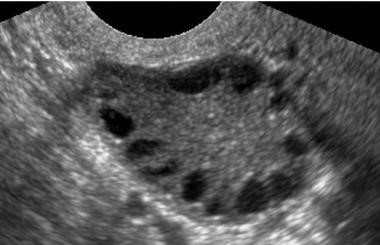#ThursdayThoughts
As promised, each Thursday, we will now offer you a piece of educational, science, or research related information. The purpose of our #ThursdayThoughts post is to share with you fact-based content that can enlighten and assist you on your fertility journey. Enjoy our post! Helping to Create New Beginnings….
PCOS (Polycystic Ovary Syndrome) – An overview
Polycystic Ovary Syndrome (PCOS) a hormonal disorder that affects reproductive aged women. It is one of the most common causes of infertility and is estimated that 70-80% of women with PCOS have infertility. The name PCOS is misleading as these patients do not have large cysts on their ovaries, instead there are an increased number of visible follicles (small fluid filled sacs that hold the eggs) on the ovaries.
PCOS is commonly diagnosed by evaluating the woman for the following:
- Irregular menses- periods that are >35 days in cycle or vary in cycle length. This is typically a sign of anovulation or oligoovulation (the lack of ovulation or infrequent ovulation).
- Excess androgens- elevated blood levels of male hormones. Patients that have elevated androgen levels may shows signs such as increase in facial and body hair and/or severe acne.
- Polycystic appearing ovaries on ultrasound- having more follicles on the ovaries than the average person. This is seen by performing a pelvic ultrasound and visualizing the ovaries. Patients may often have a classic “string of pearls” appearance of the ovaries (as seen above).
Infertility is a common complication of having PCOS. If you are not ovulating (releasing an egg), then pregnancy cannot be achieved. Medications can be used to facilitate ovulation. Many patients with PCOS will achieve pregnancy using medications for ovulation and having timed intercourse. However, there are other medical complications of PCOS that patients should be aware of which include but are not limited to: diabetes, gestational diabetes (diabetes during pregnancy), miscarriage, metabolic syndrome, heart disease, hypercholesterolemia, cancer of the uterine lining, as well as several others. Therefore, it is important to be seen by a doctor for this syndrome even if you are not trying to get pregnant.
Treatment for PCOS can be for fertility or non-fertility reasons and can vary depending on the severity. For more information regarding available treatment options, please schedule an appointment with one of our providers at the Fertility Institute of Hawaii 808-545-2800 or visit our website at https://www.ivfcenterhawaii.com
